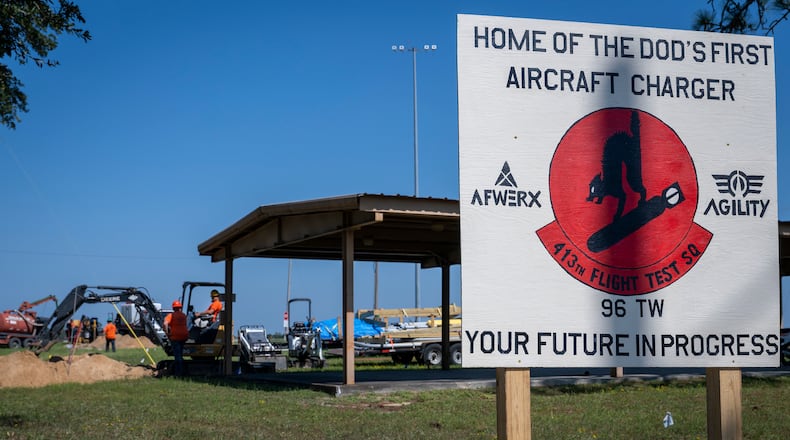AFWERX nurtures emerging technologies for Air Force Research Laboratories, which is based at Wright-Patterson Air Force Base.
The expected completion for the Level 3 direct current electric vehicle fast charging station construction is Oct. 13, weeks before BETA’s electric vertical take-off and landing (eVTOL) aircraft arrives for testing.
To achieve the speeds necessary for fast charging, Level 3 chargers require an extremely high-powered current, the Air Force said in a release.
”Level 1 is a typical home power outlet and would take days to charge an eVTOL. Level 2 is a dryer or air conditioning outlet and would take hours. Level 3 is a supercharger and only takes minutes,” said Maj. Riley Livermore, 413th Flight Test Squadron flight commander.
“And that’s what these companies need, because if you want to make it viable from a commercial or military perspective, I can’t wait 24 hours to charge my airplane. They need to do it in less than an hour,” Livermore said.
Last week, Joby Aviation Inc. announced with the state of Ohio plans to build the world’s first large-scale production facility for eVTOL aircraft near Dayton International Airport.
BETA also has area connections, with a permanent presence at the Springfield-Beckley Municipal Airport, and its own air mobility technology simulator located there.
To provide enough power to the 480-volt, 400-amp charging station, Livermore said the base had to upgrade its power grid and bought a 1000-kilowatt volt-amp transformer that can increase or decrease the voltage and intensity of an electric current while keeping electricity flow consistent.
“You can power roughly 250 homes simultaneously with the amount of power one charger is using,” Livermore said.
Duke Field is about 10 miles north of Eglin Air Force Base. The Air Force said it was strategically selected as the test field for eVTOL craft.
About the Author

